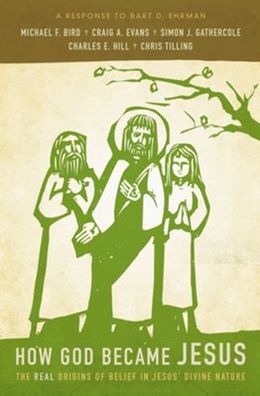BOOK REVIEWS
-
-

HOW GOD BECAME JESUS: THE REAL ORIGINS OF BELIEF IN JESUS' DIVINE NATURE – A RESPONSE TO BART D. EHRMAN
By: Michael F. Bird, Craig A. Evans, Simon Gathercole and Charles E. Hill.
Publisher: Zondervan (March, 2014)
ISBN-10: 0310519594 ISBN-13: 978-0310519591
This book is not a light read, but it may be an important one for anyone who has been troubled by books which attempt to “deconstruct” the divinity of Jesus. Usually, when books of that type are published, believers are left trying to counter their arguments in reviews that are rarely seen by the people who actually read the book in question. In this case, the publishers are to be commended for their decision to publish both How Jesus Became God: The Exaltation of a Jewish Preacher from Galilee by Bart D. Ehrman, and the rebuttal by a number of Christian scholars which is the subject of this review. The two books are published, respectively, through the HarperOne and Zondervan branches of Harper Collins.
Essentially, Ehrman's side of the argument is that Jesus was a mortal man who gradually, through time, came to be regarded as more and more divine, until he ultimately – and not until several centuries had elapsed – came to be regarded as being God. It is worth noting that Ehrman refuses to look at the evidence of the Gospel of John or the Book of Revelation which he essentially discounts as being “late” and so not as “trustworthy” as the earlier gospels.
If you read Ehrman’s book before reading the rebuttal, you may well agree that the authors of How God Became Jesus do a good job of summarizing Ehrman’s arguments before taking them on. They also duly credit Ehrman when he poses good questions or arguments and wrestle with these difficulties in an honest and open manner. Nevertheless, Michael Bird and his coauthors bring a great deal of combined scholarship to the discussion, and they present an impressive amount of counter evidence and argument. They do this in the course of ten chapters, taking on such topics as “Did Jesus Think He was God,” “What Did the First Christians Think About Jesus,” and “Misreading Paul’s Christology.”
It would seem to this reviewer that in each chapter the authors of How God Became Jesus are successful in countering a number of Ehrman’s arguments; and I think that most open-minded readers would conclude that at the very least they certainly take away any conclusiveness to his stated case. In some cases, such as their critique of Ehman’s discussion of the evidence for the resurrection of Jesus, they clearly have the upper hand. As one neutral reviewer has written: “Even those sympathetic to Ehrman’s case would probably agree that his discussion of the empty tomb contains too much conjecture.” On the other hand, no aspect of history is without different possible viewpoints and sometimes confusing or even contradictory facts.
Michael Bird summarizes the situation in saying that he and his fellow authors “… don’t deny that it took time for the earliest churches to sort out in their own minds who Jesus was, to determine what Scriptures best expressed his purpose and identity…. It was a messy process with many steps forwards and few backwards. That said, we think the evidence points to the fact that early on, certainly within 20 years of his death, Jesus was identified and worshiped in such a way as to make it clear that he was regarded as being intrinsic to the God of Israel’s own identity.”
How God Became Jesus is not for everyone, but for those who have been troubled directly or indirectly by the position taken in Ehrman’s book, and others like it, it is an invaluable counter discussion which shows once again that faith is not antithetical to reason, and that there are perfectly good – and defensible – arguments for believing that God became the man Jesus.